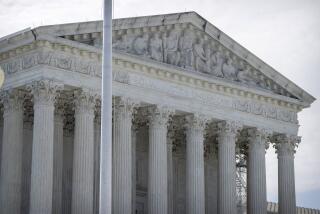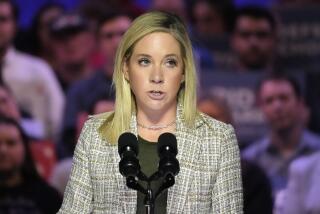Supreme Court’s female justices take aim at Texas abortion restrictions
- Share via
Reporting from Washington — The three women on the Supreme Court led an attack Wednesday on a Texas law that would shut down about three-fourths of the state’s abortion clinics.
This law “is targeting abortion,” said Justice Sonia Sotomayor.
During an hour-long argument over what could be the court’s most important abortion case in a generation, the justices sounded closely split and debated with each other whether Texas had gone too far in setting stringent new regulations for doctors and clinics that perform abortions.
Justice Anthony M. Kennedy, who probably holds the deciding vote, asked skeptical questions of both sides. At one point, he suggested the court might want to send the case back to a trial judge in Texas to provide more evidence on the impact of the state’s restrictions.
The Texas case has been closely watched because it could determine how far states may go to regulate and restrict abortion. Such a ruling stands to impact millions of women nationwide.
Aware of the stakes, the three women on the court took a lead role and said it was obvious to them that the Texas lawmakers had singled out abortion clinics for unduly strict regulations that would hurt women rather than protect them, as state officials had claimed.
Justice Ruth Bader Ginsburg noted that one provision requires women to visit an outpatient surgical center even when they are simply taking a pill to induce a medical abortion. Many women would have to travel hundreds of miles to get there, Ginsburg said.
“I can’t imagine what is the benefit of having a woman take those pills in an ambulatory surgical center when there is no surgery involved,’’ she said. “Even if a complication arises, it will be after the woman is back home.”
Justices Sotomayor and Elena Kagan said Texas does not similarly regulate other medical procedures that are more risky, including dental surgery and colonoscopies. Doctors can perform those procedures safely in a doctor’s office, not a well-equipped surgical center, they said.
Justice Stephen Breyer, the court’s fourth Democratic appointee, also said he could not see a reasonable basis for upholding the restrictions.
Meanwhile, Chief Justice John G. Roberts Jr. and Justice Samuel A. Alito Jr., appointees of former President George W. Bush, led the defense of the Texas law. They questioned whether abortion-rights advocates had shown that the new regulations had indeed shut down many clinics and would leave women with limited options.
Since there would be well-equipped abortion facilities in the state’s major metropolitan areas, Roberts said it was not clear the law posed a “substantial obstacle” for women who seek an abortion.
Kennedy asked one question that hinted he may lean in favor of the challengers. He said the law’s restrictions have led to an increase in surgical abortions and a drop in the number of medically induced abortions. That is “not medically wise,” he told Texas Solicitor General Scott Keller, a former law clerk for Kennedy.
The justices will meet Friday to vote on the Texas case. There are at least four possibilities, given the recent death of conservative Justice Antonin Scalia. If Kennedy votes with the four liberal justices, they could decide that the Texas law is unconstitutional.
If Kennedy votes with the three remaining conservatives, the court will be evenly divided and unable to issue an opinion. The tie vote would have the effect of affirming the 5th Circuit Court of Appeals, which upheld the Texas law.
A third possibility would be to send the case back to Texas for further hearings. It’s also possible the justices will hold on to the Texas case until next summer or longer, awaiting confirmation of the new justice to fill the ninth seat.
Also this week, the justices will likely decide on whether to allow Louisiana to enforce a similar law that is expected to close all but one abortion clinic there. Abortion-rights advocates filed an emergency appeal asking the high court to put the Louisiana law on hold.
On Twitter: @DavidGSavage
More to Read
Sign up for Essential California
The most important California stories and recommendations in your inbox every morning.
You may occasionally receive promotional content from the Los Angeles Times.











